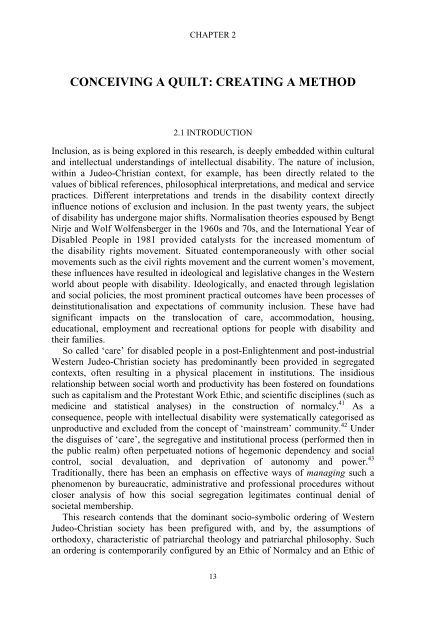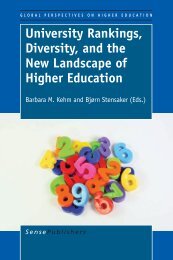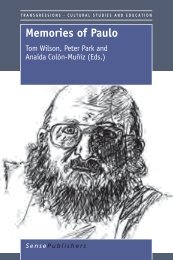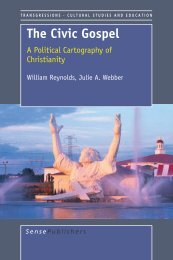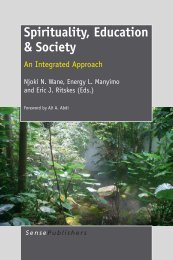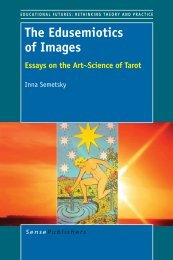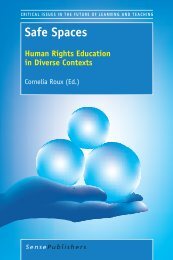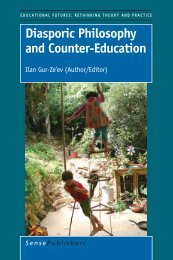Rupturing Concepts of Disability and Inclusion
Rupturing Concepts of Disability and Inclusion
Rupturing Concepts of Disability and Inclusion
You also want an ePaper? Increase the reach of your titles
YUMPU automatically turns print PDFs into web optimized ePapers that Google loves.
CHAPTER 2<br />
CONCEIVING A QUILT: CREATING A METHOD<br />
2.1 INTRODUCTION<br />
<strong>Inclusion</strong>, as is being explored in this research, is deeply embedded within cultural<br />
<strong>and</strong> intellectual underst<strong>and</strong>ings <strong>of</strong> intellectual disability. The nature <strong>of</strong> inclusion,<br />
within a Judeo-Christian context, for example, has been directly related to the<br />
values <strong>of</strong> biblical references, philosophical interpretations, <strong>and</strong> medical <strong>and</strong> service<br />
practices. Different interpretations <strong>and</strong> trends in the disability context directly<br />
influence notions <strong>of</strong> exclusion <strong>and</strong> inclusion. In the past twenty years, the subject<br />
<strong>of</strong> disability has undergone major shifts. Normalisation theories espoused by Bengt<br />
Nirje <strong>and</strong> Wolf Wolfensberger in the 1960s <strong>and</strong> 70s, <strong>and</strong> the International Year <strong>of</strong><br />
Disabled People in 1981 provided catalysts for the increased momentum <strong>of</strong><br />
the disability rights movement. Situated contemporaneously with other social<br />
movements such as the civil rights movement <strong>and</strong> the current women’s movement,<br />
these influences have resulted in ideological <strong>and</strong> legislative changes in the Western<br />
world about people with disability. Ideologically, <strong>and</strong> enacted through legislation<br />
<strong>and</strong> social policies, the most prominent practical outcomes have been processes <strong>of</strong><br />
deinstitutionalisation <strong>and</strong> expectations <strong>of</strong> community inclusion. These have had<br />
significant impacts on the translocation <strong>of</strong> care, accommodation, housing,<br />
educational, employment <strong>and</strong> recreational options for people with disability <strong>and</strong><br />
their families.<br />
So called ‘care’ for disabled people in a post-Enlightenment <strong>and</strong> post-industrial<br />
Western Judeo-Christian society has predominantly been provided in segregated<br />
contexts, <strong>of</strong>ten resulting in a physical placement in institutions. The insidious<br />
relationship between social worth <strong>and</strong> productivity has been fostered on foundations<br />
such as capitalism <strong>and</strong> the Protestant Work Ethic, <strong>and</strong> scientific disciplines (such as<br />
medicine <strong>and</strong> statistical analyses) in the construction <strong>of</strong> normalcy. 41 As a<br />
consequence, people with intellectual disability were systematically categorised as<br />
unproductive <strong>and</strong> excluded from the concept <strong>of</strong> ‘mainstream’ community. 42 Under<br />
the disguises <strong>of</strong> ‘care’, the segregative <strong>and</strong> institutional process (performed then in<br />
the public realm) <strong>of</strong>ten perpetuated notions <strong>of</strong> hegemonic dependency <strong>and</strong> social<br />
control, social devaluation, <strong>and</strong> deprivation <strong>of</strong> autonomy <strong>and</strong> power. 43<br />
Traditionally, there has been an emphasis on effective ways <strong>of</strong> managing such a<br />
phenomenon by bureaucratic, administrative <strong>and</strong> pr<strong>of</strong>essional procedures without<br />
closer analysis <strong>of</strong> how this social segregation legitimates continual denial <strong>of</strong><br />
societal membership.<br />
This research contends that the dominant socio-symbolic ordering <strong>of</strong> Western<br />
Judeo-Christian society has been prefigured with, <strong>and</strong> by, the assumptions <strong>of</strong><br />
orthodoxy, characteristic <strong>of</strong> patriarchal theology <strong>and</strong> patriarchal philosophy. Such<br />
an ordering is contemporarily configured by an Ethic <strong>of</strong> Normalcy <strong>and</strong> an Ethic <strong>of</strong><br />
13


